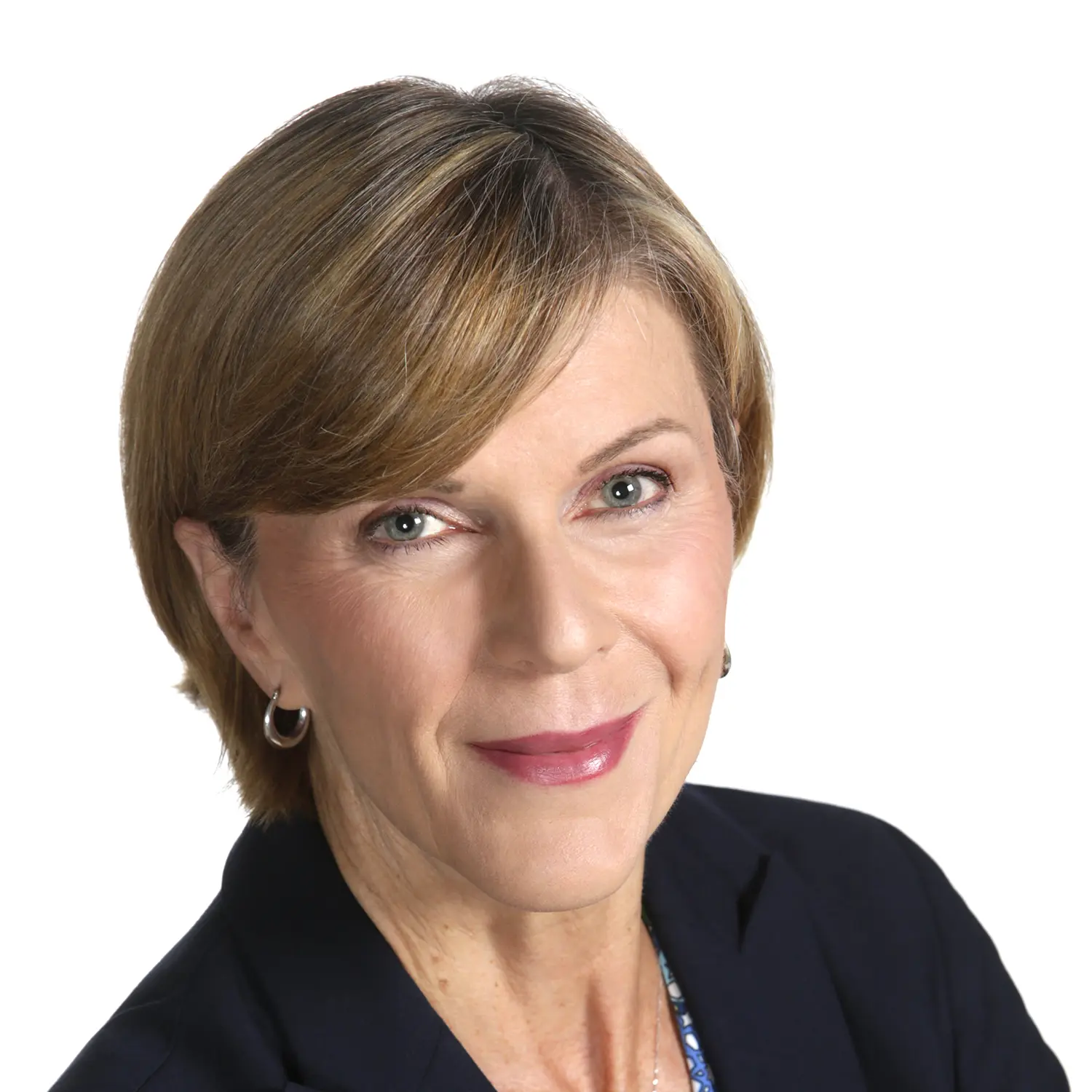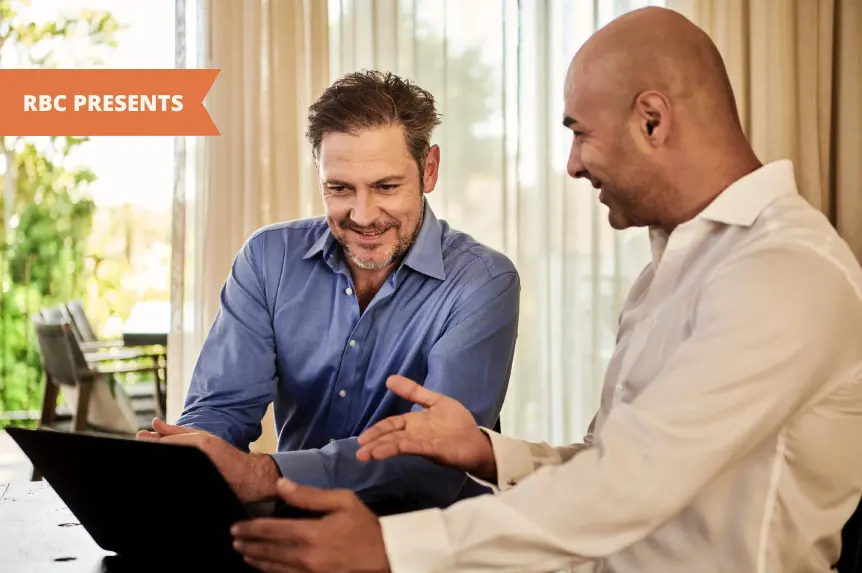How Much Do Funerals Cost? (And How To Plan One)

Losing a loved one is a challenging experience to go through. On top of dealing with the loss, handling funeral costs is often left to the grieving family members as an additional burden.
Funerals can carry a hefty cost. Sometimes and often require stressful on-the-spot decision making. Because of this, you may choose to arrange your funeral service in advance to lift some of the burden off of your family’s shoulders.
Funeral arrangements aren’t really something we think about day-to-day. It’s okay to have questions about the process or not know where to begin.
Here are some guidelines on how to arrange some things in advance and allocate money in your Will so your executor can organize everything easily after you’re gone.

The typical cost of a funeral
The average cost of a funeral can vary depending on your province and the funeral service provider you choose. However, there are a few basic things to consider before looking at more refined details.
Who will manage the costs?
If you’ve made your Will, the person named as your estate trustee (or executor) is the only person legally able to carry out your funeral and burial wishes after you pass. When making your Will, it’s also a great idea to complete a funeral and burial wishes document, so you don’t leave any aspect of your funeral and burial up to guesswork.
If you don’t have a Will, someone must apply to be appointed as your administrator by the court. Without a Will, these are the only people who can act as your representative to manage your funeral and associated costs:
An administrator appointed by the court
Your spouse
Your adult children
Before you begin: Obtaining a death registration and certificate
Getting a death certificate is one of the few things you cannot prepare for in advance. It may only be issued by the government once there is legal documentation of a person’s death. What you can do is set aside a small fund and layout helpful instructions for your executor to follow.
Whoever is organizing your funeral will need a death certificate before they can do anything else.
A death certificate is also necessary when applying for benefits and making insurance claims for end-of-life financing. Getting a death certificate from ServiceOntario can cost you a fee between $15 to $52 depending on the urgency of your situation and the speediness of delivery.
Planning: Potential Funeral Costs
When arranging a funeral, there are a variety of approaches ranging from very expensive to more affordable and basic. It all depends on how much you’re willing to do yourself.
Thankfully, you can plan many of these end-of-life costs ahead of time.
Let’s look at some of the available options and prices out there.
More Expensive: Funeral homes
Funeral homes provide professional funeral director services for the deceased and their grieving families.
Most funeral homes offer service packages that include cremation, embalming, and casket transportation. When combined, these services may add up to anywhere from $1,000 to $9,000.
Despite being one of the more expensive avenues, many people opt for funeral home services because of their convenience.
Of course, it is up to you whether you’d like to organize all the elements yourself or pay a fee for a professional funeral director to put everything together.
Questions to ask when choosing a funeral home
You should take your time finding a good funeral home when enlisting professional help. Ask the funeral home staff if you can read through their price list or a pamphlet of their basic package plans, and note down the costs.
To ensure that the funeral proceedings will be in capable, trustworthy hands, ask the following questions when consulting with a funeral home.
How long have you been in the funeral home business?
Do you belong to a professional association of funeral homes?
Are funeral services handled by staff, a professional funeral director, or vendors?
Is _____ included in your basic package or does it require an extra fee?
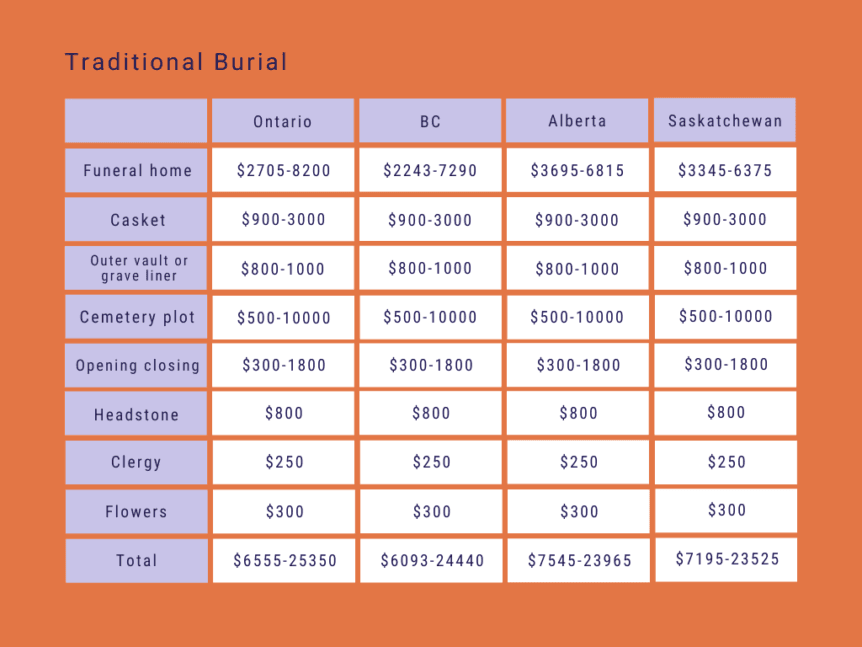
Less Expensive: DIY Funeral Planning
Another approach is to organize the funeral or memorial services yourself. There are definitely more things to think about when planning your own funeral and burial, but you’ll have the peace-of-mind of knowing you took matters into your own hands and saved some costs along the way.
In Canada, the two most common methods of laying a body to rest are in-ground burial and cremation.
Cost of a burial
In Western culture, in-ground burials have been the traditional method for most people. There are two common approaches when it comes to burials:
Traditional
Direct
A traditional burial includes the full package including visitation, ceremony, and reception. This is all for a price tag of around $13,000, although cost can vary.
In comparison, direct burial is when the body is buried shortly after death. Without any other services or a formal ceremony, direct burials can cost around $11,000 in Canada.
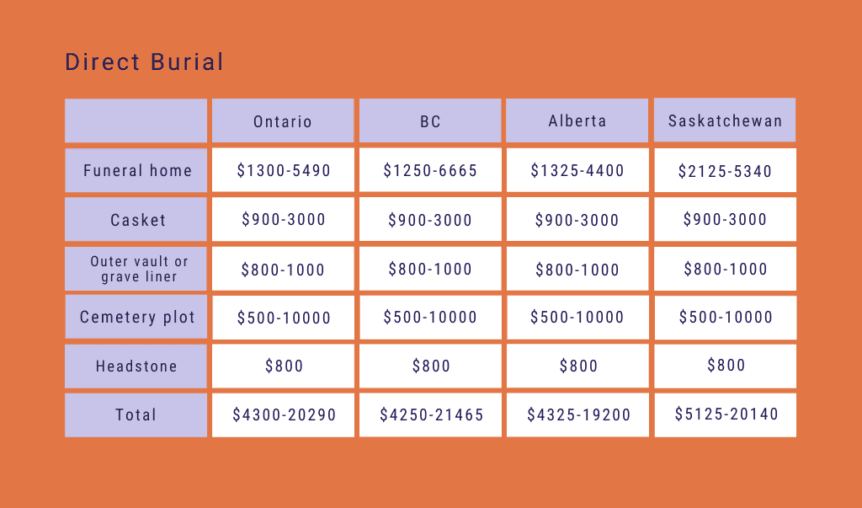
Casket
Caskets come in all shapes and prices—some cost more than $3,000!
Remember, there are more places to buy caskets than just funeral homes. Costco Canada sells caskets and range from $900 to $1,600.
Outer burial vaults are another component of burials, as they encase a casket and prevent it from sinking. Casket vaults can cost around $800 at most vendors.
Grave liners are another choice. They cover the top and sides of a casket and are often slightly cheaper than outer burial vaults.
Body preparation & embalming
Body preparation involves bathing, grooming, and clothing the deceased’s body before transporting them into a casket. It typically costs about $125-$525 to hire staff for this service.
Embalming is another body preparation method that involves special preservation techniques. In Ontario, embalming is required by law if you want your funeral hosted in a different province or country.
The cost of embalming in North America is around $725. It would also be wise to include this cost in your funeral budget if you wish to have a visitation at your funeral or have your casket open during the funeral.
Cost of cremation
Cremation is a less expensive, albeit a less traditional option you can take. However, it’s getting more popular among Canadians as time goes on. The cremation rate in Canada has risen from 48% to 72% over the past two decades.
Similar to burials, you can choose from two main cremation options:
Traditional (full-service)
Direct
A full-service cremation is like a traditional burial, but you bury an urn at the grave instead of a casket. Urns are special vases made to hold cremated ashes, and they’re typically around $100-300 although they can run up to thousands of dollars.
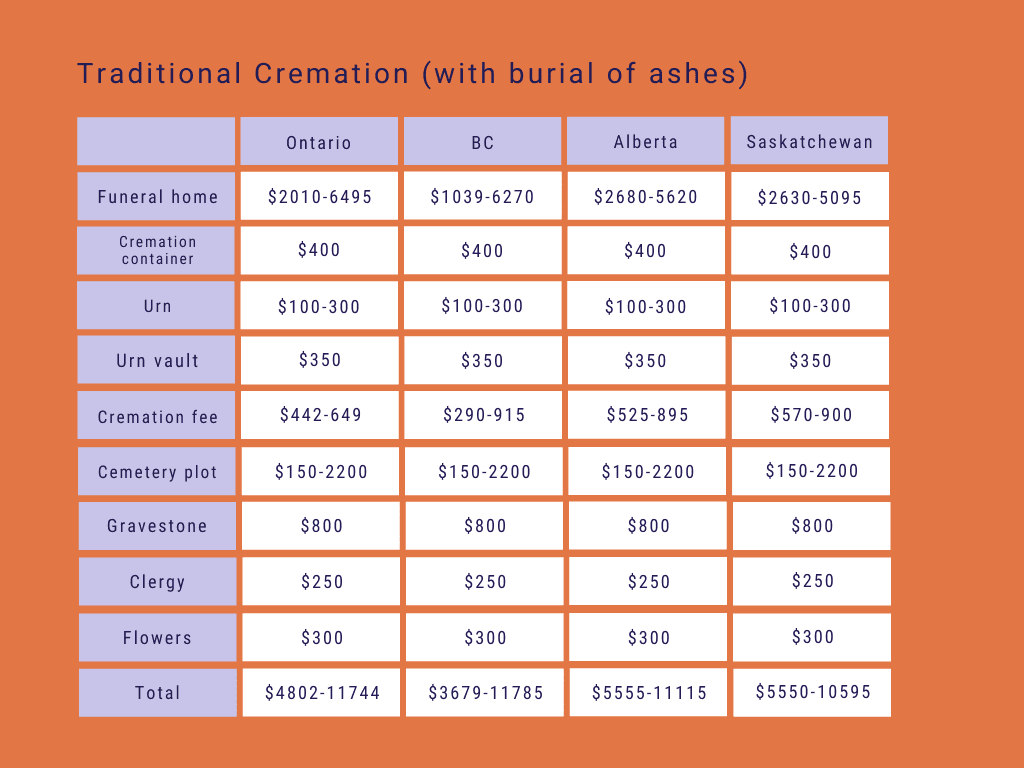
A direct cremation happens very quickly after the deceased’s passing without a visitation or memorial service. You can choose to keep cremated remains in an urn or scatter them at a location of your choice. Out of all the funeral arrangements, this would be the most budget-friendly option. A direct cremation in Toronto without an urn costs as little as $1,500.
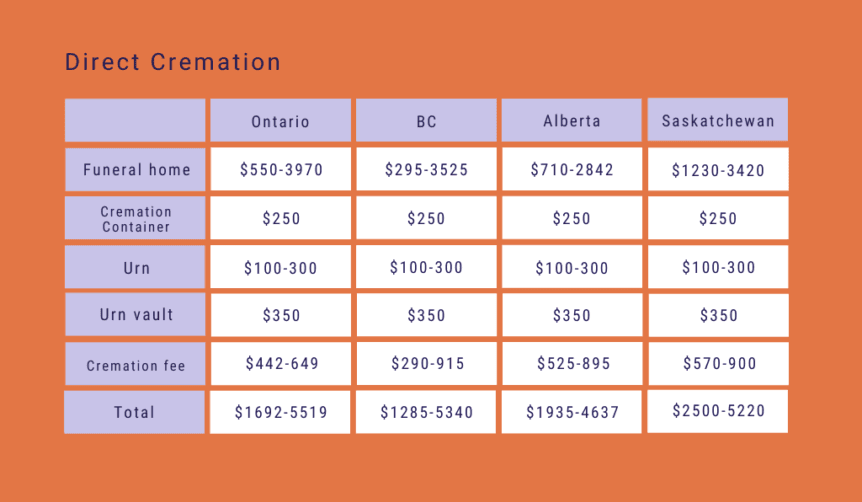
Burial plots and services
If you want a formal in-ground burial, you’ll need to arrange for a burial plot at the cemetery. This is where you are laid to rest.
In cities like Toronto, a singular plot can cost as much as $25,000. However, in most cases, the general price of a cemetery plot is around $1,000.
Ceremony
A funeral or memorial service has an average cost of around $2,000. You’ll need staff to transport the casket to the cemetery, clergy to deliver the memorial service, flowers, grave opening closing, and refreshments for the after-ceremony reception.
The nice thing about planning ahead is that you can plan for details others might not know you would have wanted. Are orchids or red roses your jam? Planning your own ceremony in advance makes sure you and your spirit are best reflected in the details of your ceremony.

Funding a funeral
The cost of a funeral can really add up in some circumstances. Fortunately, you can figure out your expenses beforehand or arrange for financial assistance to ease the minds of your executor and family.
In Canada, every person has the right to be buried.
In 2019, Ontario spent $12.4 million on funeral and cemetery costs for low-income families.
Military financial assistance
You may qualify for funeral financial assistance if you were ever of service to the Canadian military. Your executor can enlist financial help through Veteran Affairs Canada in this case.
Pro-tip: Plan ahead!
Dealing with the pressure of making funeral arrangements while coping with a loss can be a challenging experience for your family and friends. More and more people are taking those pressures off their loved ones’ shoulders by mapping out their basic after-tax expenses in advance.

Here are some guidelines on how to plan ahead for your funeral:
Put some money aside for your funeral in a savings account.
Talk to your financial advisor about buying life insurance. The death benefit paid by your insurance company can cover your funeral costs.
If you have a trusted friend or family member, have them accompany you so that you stay grounded while making arrangements or talking to funeral directors.
Pay for a burial plot at the cemetery in advance if you choose an in-ground funeral. Grave plots inflate in price every year!
If you choose a cremation, plan and pay for it in advance using a service like Eirene.
Make sure you have documented your funeral and burial wishes in detail (fun fact: when you make your Will with Epilogue, you’ll receive a funeral and burial wishes document for free!)
Final words
Setting up a funeral can be an intricate and emotional process, whether it is for yourself or someone that you love.
Remember that there are diverse approaches to end-of-life celebrations — there is no set path to follow when you’re organizing one. Canada is a patchwork country filled with many different cultures, customs, religions, and personal preferences. Make sure you get a funeral that is as unique as you are and reflects your values and beliefs by doing some preparation now while you still can.


